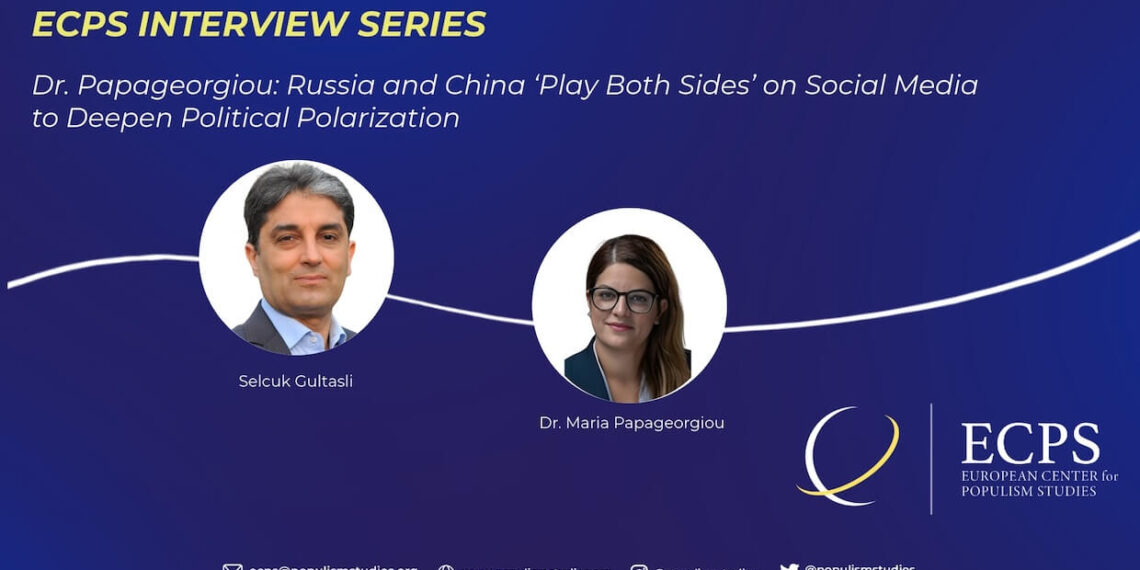In an interview with the ECPS, Dr. Maria Papageorgiou, Leverhulme Early Career Fellow at Newcastle University, examines how digital platforms have transformed both domestic politics and international relations. Drawing on her Leverhulme project on Sino–Russian disinformation synergies, she argues that Russia and China have developed a “division of labor” in online influence operations aimed at destabilizing Western democracies. “They have attempted to amplify both sides of political debates through bots and anonymous accounts—using certain elements to appeal to the right wing and others to the left… In short, they play both sides,” she explains. By exploiting emotional content and deepening polarization, these actors are reshaping democratic discourse and testing the limits of resilience in open societies.
Interview by Selcuk Gultasli
Giving an interview to the European Center for Populism Studies (ECPS), Dr. Maria Papageorgiou, Leverhulme Early Career Fellow at Newcastle University, discusses the complex relationship between digital technologies, political communication, and the global rise of disinformation. Her current Leverhulme-funded project investigates Sino–Russian disinformation synergies during UK and US elections, shedding light on how coordinated influence operations exploit social divisions and challenge democratic resilience.
According to Dr. Papageorgiou, the structural shift introduced by social mediarepresents “a more profound transformation in communication than previous technological advancements.” Unlike earlier forms of mass media that centralized information flows, today’s digital platforms empower a wide range of actors—ordinary citizens, political elites, and state institutions alike—to produce and disseminate content instantly. “It allows real-time responses, travels almost instantly, and reaches audiences across multiple countries and languages,” she explains. Yet this democratization of communication also carries serious consequences: “Online content often contains false or exaggerated claims, leading to more emotional forms of political expression and, ultimately, to polarization.”
These dynamics are not confined to domestic politics. In the international arena, Dr. Papageorgiou notes that states increasingly use social media to construct and project national identity in real time, especially during crises. She points to cases such as Russia’s and China’s digital diplomacy during the COVID-19 pandemic and the Ukraine war, when both countries sought to frame themselves as responsible global powers while amplifying counter-narratives to Western accounts. “Particularly during times of crisis, when information circulates in real time, states amplify their social media presence… to more easily frame and project their national identity,” she observes.
Her research finds that Russia and China have developed a complementary “division of labor” in influence operations, pursuing shared objectives of weakening Western unity and credibility. “They have attempted to amplify both sides of political debates through bots and anonymous accounts—using certain elements to appeal to the right wing and others to the left,” Dr. Papageorgiou explains. “They are particularly focused on exaggerating existing polarization, using these accounts to disseminate emotionally charged content designed to provoke reactions. In short, they play both sides.”
For Dr. Papageorgiou, this pattern highlights a wider transformation in global political communication: the erosion of traditional information hierarchies and the normalization of populist performance in digital spaces. “Digital platforms enable a more populist style of performance, especially when one holds executive authority,” she concludes. “We can now see that it is almost impossible to return to older forms of communication. The public is no longer receptive to them; they have become accustomed to these newer, more direct political practices.”
In a fragmented information landscape, her insights underscore both the promise and the peril of digital politics: greater participation on the one hand, and deeper division on the other.


